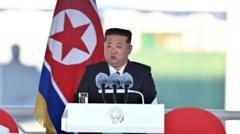The Chinese government's campaign against online literature has surged, particularly targeting the niche genre known as Boys’ Love, which centers around romantic relationships between male characters. This genre, predominantly created by and for heterosexual women, has seen a cultural explosion since its roots in Japan in the 1990s, becoming a significant part of fandom culture in China.
A recent round-up has resulted in the interrogation and detention of dozens of writers who have published gay erotic novels online. Many of the affected authors are young women who, in their spare time, took to the digital world to share their stories. For instance, one graduate student from southern China wrote a 75-chapter romance novel featuring two male protagonists, earning less than $400 from readers before potentially facing criminal charges for obscenity.
Court documents reveal that at least 12 authors were already sentenced last year in Anhui Province for similar charges, while various new investigations have begun across provinces such as Gansu this spring. Those convicted have faced heavy fines and prison sentences, reflecting the government's harsh stance on what it deems "obscene" content.
Boys’ Love fiction rose to stature in China, creating cult followings and contributing to the ascension of numerous actors and cultural figures through popular web dramas. However, in recent years, state media has increasingly condemned such works as "vulgar," alleging they could negatively influence young readers’ perceptions of sexual orientation. This shift in stance has led to the cancellation of many popular shows, along with formal bans on adaptations of Boys’ Love content.
The crackdown has reshaped the landscape for writers and fans of this genre, which once provided a refreshing break from traditional portrayals of romance. As penalties for this form of storytelling escalate, the future of Boys’ Love fiction in China hangs in the balance amid ongoing censorship and societal pressures.
A recent round-up has resulted in the interrogation and detention of dozens of writers who have published gay erotic novels online. Many of the affected authors are young women who, in their spare time, took to the digital world to share their stories. For instance, one graduate student from southern China wrote a 75-chapter romance novel featuring two male protagonists, earning less than $400 from readers before potentially facing criminal charges for obscenity.
Court documents reveal that at least 12 authors were already sentenced last year in Anhui Province for similar charges, while various new investigations have begun across provinces such as Gansu this spring. Those convicted have faced heavy fines and prison sentences, reflecting the government's harsh stance on what it deems "obscene" content.
Boys’ Love fiction rose to stature in China, creating cult followings and contributing to the ascension of numerous actors and cultural figures through popular web dramas. However, in recent years, state media has increasingly condemned such works as "vulgar," alleging they could negatively influence young readers’ perceptions of sexual orientation. This shift in stance has led to the cancellation of many popular shows, along with formal bans on adaptations of Boys’ Love content.
The crackdown has reshaped the landscape for writers and fans of this genre, which once provided a refreshing break from traditional portrayals of romance. As penalties for this form of storytelling escalate, the future of Boys’ Love fiction in China hangs in the balance amid ongoing censorship and societal pressures.




















